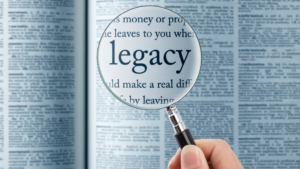
By Steve Lowrie, CFA
Special to the Financial Independence Hub
Most posts about legacy, wills, and estate planning focus on how to settle your estate after you pass: ensuring your intentions are met, your family is cared for, charitable gifts are fulfilled, taxes are minimized, and so on.
Estate planning is important; we help clients with it all the time. But today, I’d like to offer a valuable twist on the theme of estate, life, and legacy planning:
Instead of your excess wealth being distributed after you die, you may find even greater value in giving some of it away while you’re still around.
Properly managed, making gifts and charitable donations while you’re alive can offer solid tax-saving benefits to you and your estate financial planning. In particular, targeted charitable giving can be a powerful tool for business owners and similar professionals who are approaching retirement and facing high-tax events, such as selling their business, or exercising highly appreciated stock options.
As importantly, it can be incredibly rewarding to witness the results of your generosity. Don’t underestimate the value this intangible benefit can add to your life and legacy planning.
Legacy Planning for Quality Living
First, what is “excess wealth?” Is there such a thing as too much money??? Not really.
This is where legacy planning is essential. If you’re thinking about spending, gifting, or donating significant wealth, don’t just guess at the dollar amounts. Instead, you and your financial advisor should periodically crunch the numbers to determine how much you and your loved ones conservatively need to remain well-positioned, even under worst-case scenarios (such as, say, a global pandemic).
After that — if you and your loved ones are indeed set for life — any extra resources become the financial equivalent of gravy on your entrée. How will you use your excess wealth to add flavour to your life and to the lives of others so that you are leaving a legacy you can be proud of?
An anecdote about Lifetime Charitable Giving
To envision what it would be like to make one or more significant charitable donations during your lifetime, consider the story of “John and Jane,” an earnest couple in their 60s who came to me for advice a few years ago. John came from meager roots, but he was determined to make his own way. With a boost from some financial aid, he put himself through college, where he met Jane. Together, they worked hard, scrimped and saved, and raised two kids. Along the way, John started his own business, which prospered.
Fast forward to 2020, when John was able to sell his business for a substantial sum of money. After we ran all the numbers, it was clear he, Jane, and even their kids would be able to live comfortably for their remaining days. Both personally and in a holding company, the couple also owned some taxable investments that had appreciated nicely.
So far, so good. However, there was one challenge (even if it was a nice “problem” to have): even with extensive planning in the anticipation of an eventual sale (purified operating company, multiplying the lifetime capital gain exemption, etc.), the business buy-out would generate hundreds of thousands of dollars in taxes in the year of the sale. As the saying goes, when you’ve incurred taxable gains, you can choose who’s going to benefit the most from the taxable portion: the government, or your favorite charities. I suggested to John and Jane, they could reduce their taxes owed in the year of the sale by instead fulfilling some of their existing charitable intents that same year.
To manage the significant donation they had in mind, we established a Donor-Advised Fund (DAF) in their name. They then donated into their DAF an equal amount to the taxes incurred from the sale of John’s business. This helped them accomplish several goals:
- They were able to fully offset the taxable buy-out gains with their charitable contribution.
- John was able to fulfill a lifelong dream by using some of the DAF assets to establish a scholarship at his alma mater. By doing so during his lifetime, he has been able to see others benefiting from a solid education, just as he had when he was young. On a personal level, he and Jane have found the experience highly rewarding.
- Moving forward, they can donate highly appreciated assets to their DAF to wash away those gains as well.
A DAF offers a few other benefits as well. For example, you can direct how to invest undistributed DAF dollars in the market, potentially increasing your giving power over time. You can also keep your charitable giving anonymous if you’re so inclined. Continue Reading…


